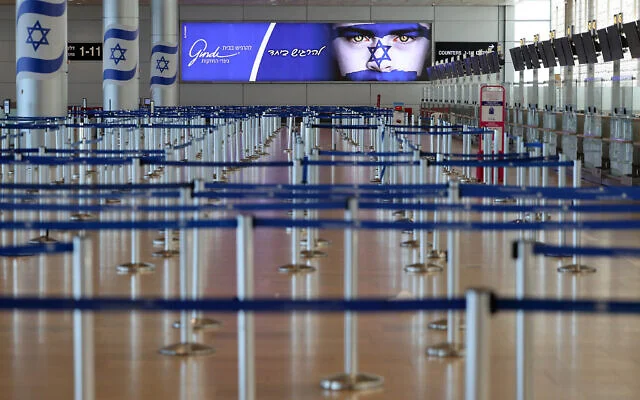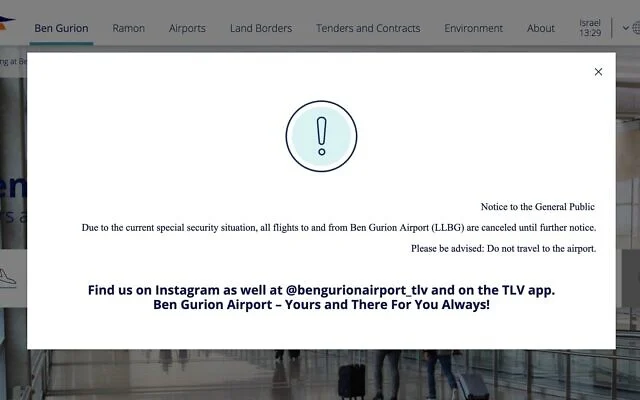With airspace closed amid conflict with Iran, authorities say it will take weeks before the tens of thousands of Israelis stuck abroad will get home; El Al works on rescue flight plan
Israeli authorities have cautioned citizens stranded abroad against rushing to Larnaca or Athens in the hope of getting home sooner, as Israeli airspace remains closed for both arrivals and departures until further notice.

The National Security Council on Sunday also ordered Israelis not to try to reach Israel by land through the border crossings from Jordan or Egypt’s Sinai Peninsula. Both countries are under Level 4 warnings, which means, according to the NSC website, that “travel to this destination is prohibited. Those who are already there must leave immediately.”
Some 50,000 Israelis are believed to be stuck overseas — Channel 12 estimated Sunday that the figure was some 100,000 — after authorities closed Israel’s airspace early on Friday as the army carried out initial waves of strikes against Iran and its nuclear program. Ben Gurion Airport was closed to all arrivals and departures and has remained so “until further notice.”
El Al Israel Airlines on Sunday canceled all flights till June 17, and dozens of flights until June 23, amid preparations to rescue stranded Israelis. “When approval is received from the relevant security and aviation authorities, we will do everything in our power to enable as many Israelis as possible to return home by gradually resuming a regular flight schedule, and operating rescue flights from destinations close to Israel,” El Al said.
“There is no recommendation for Israelis staying abroad to travel to Larnaca or Athens at this stage, intending to board a flight back to Israel from there,” the Israel Airport Authority said. “Even when the security establishment allows the resumption of flights, the rate of flights will be limited to minimise risks and maintain the safety of passengers and aircraft.”
“Passengers can expect to wait for days until a return flight is actually possible,” the airport authority warned.
The authority is asking Israelis stranded abroad to “act responsibly, to wait for official updates.”

The clarification came as the authority earlier on Sunday announced that it was collaborating with Israeli airlines on a systematic plan prepared by the Transportation and Road Safety Ministry and the Israel Civil Aviation Authority to bring back Israelis stranded abroad.
“All air crews and aircraft are ready for action as soon as this becomes possible,” the airport authority said. “However, this may take a long time, depending on the security situation.”
“A decision to resume flights to Israel will only be made once it is deemed safe to do so,” it added.

During previous wars and rounds of conflicts, Larnaca and Athens have served as hubs to bring stranded Israelis back home. Last August, El Al Israel Airlines and other local carriers added flights from nearby destinations such as Greece and Cyprus to help Israelis stranded overseas return home after most foreign carriers halted their flight services to the country.
Late on Saturday, Shmuel Zakai, the head of the Civil Aviation Authority, estimated that it would take weeks before all Israelis stranded abroad would be able to fly home.
“We won’t restart airport operations at a full pace. It will be slow, in stages, and it may cease for certain periods,” Zakai said as he warned against “creating illusions” of a quick return home.
In its statement Sunday, El Al said it would update its website and social media channels “when the option to book tickets for [rescue and resumed] flights opens.”
“Registration for rescue flights will be done via a dedicated link on the El Al website,” El Al said. “The only way to reserve a seat on these flights is through registration on the El Al website only (registration at call centers will not be possible).”
Some Israelis returned over land in the past two days, before the NSC issued its warning not to do so. John, who asked not to use his real name, arrived in Israel on Saturday after entering via the Taba land border crossing with Egypt, also known as the Menachem Begin Crossing. His journey started on Friday at 4 p.m. when he flew from Geneva on Turkish Airlines via Istanbul to the Egyptian coastal resort of Sharm el-Sheikh.
“Arriving in Sharm el-Sheikh, I had a prebooked taxi, which took about 2.5 hours on a quite easy and good road to the crossing,” John, who holds dual Israeli-German citizenship, told The Times of Israel while traveling on a bus from Eilat to Tel Aviv. “I saw many Arab Israelis taking this route to come back, and there were holdups for some travelers,” John said.
Israel targeted Iran’s nuclear facilities and ballistic missile factories overnight Thursday-Friday at the start of what it warned would be a prolonged operation to prevent Tehran from attaining nuclear weapons. In response, Iran has launched retaliatory barrages at Israel from Friday night into early Sunday morning.
In addition to Israel, Iran, Iraq, Jordan and Syria have closed their airspaces. Hundreds of flights were forced to turn back or reroute when the strikes began. Early on Saturday, Jordan reopened its airspace for civilian air traffic but closed it again late that day. As of Sunday morning, the kingdom’s airspace had reopened for civilian air traffic.
Also read: Maps and photos: The Israel-Iran conflict
Source: Sharon Wrobel – The Times of Israel


